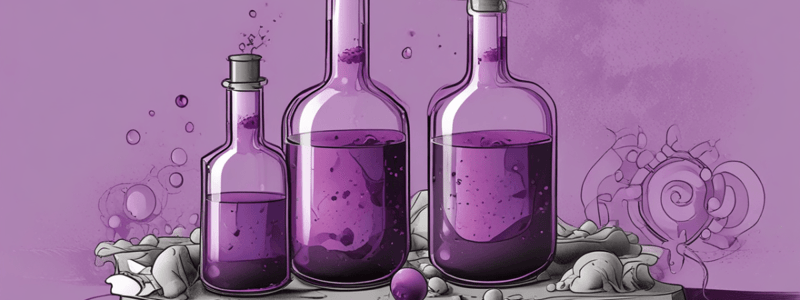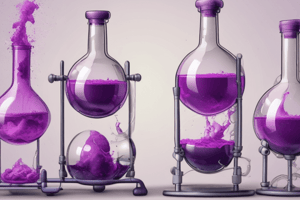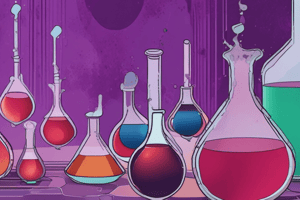Podcast
Questions and Answers
What is the oxidation state of Mn in Potassium Permanganate?
What is the oxidation state of Mn in Potassium Permanganate?
- +2
- +10
- +4
- +7 (correct)
Why is dilute sulphuric acid added to the KMnO4 solution?
Why is dilute sulphuric acid added to the KMnO4 solution?
- To decrease the pH of the solution
- To prevent the iron(II) in the solution from reacting with the air (correct)
- To increase the rate of reaction
- To change the colour of the solution
What is the purpose of using acidic conditions during the titrations?
What is the purpose of using acidic conditions during the titrations?
- To ensure complete reduction of Mn (correct)
- To prevent the formation of iron(III)
- To decrease the pH of the solution
- To increase the rate of reaction
What is the ratio of moles of MnO₄⁻ to moles of Fe²⁺ in the reaction in Experiment 1?
What is the ratio of moles of MnO₄⁻ to moles of Fe²⁺ in the reaction in Experiment 1?
Why is the volume reading taken from the top of the meniscus when adding KMnO4 to the burette?
Why is the volume reading taken from the top of the meniscus when adding KMnO4 to the burette?
What is the oxidising agent in the Iodine vs Thiosulphate titration?
What is the oxidising agent in the Iodine vs Thiosulphate titration?
What is the final colour of the solution after the Potassium permanganate vs ammonium iron(II) sulfate titration (exp1)?
What is the final colour of the solution after the Potassium permanganate vs ammonium iron(II) sulfate titration (exp1)?
Why is DI water used in this experiment?
Why is DI water used in this experiment?
What is the role of excess potassium iodide in the iodine solution?
What is the role of excess potassium iodide in the iodine solution?
What is the oxidizing agent responsible for displacing iodine in the reaction?
What is the oxidizing agent responsible for displacing iodine in the reaction?
What is the purpose of adding starch indicator to the solution?
What is the purpose of adding starch indicator to the solution?
What is the function of sulphuric acid in the iodine solution?
What is the function of sulphuric acid in the iodine solution?
What is the active ingredient in bleaches responsible for the redox reaction?
What is the active ingredient in bleaches responsible for the redox reaction?
What is the balanced equation for the redox reaction involving iodine and sulphite ions?
What is the balanced equation for the redox reaction involving iodine and sulphite ions?
Flashcards are hidden until you start studying
Study Notes
Redox Reaction: Potassium Permanganate and Ammonium Iron(II) Sulfate
- Potassium Permanganate (KMnO4) is an oxidizing agent that contains Mn in the (+7) oxidation state.
- Ammonium Iron(II) Sulfate is a primary standard.
- In acidic conditions, Mn is reduced, reacting with air to form iron(III), and dilute sulphuric acid is added to prevent this.
- If acidic conditions are not used, an intermediate oxidation state (+4) will be reached.
Titration: Potassium Permanganate vs. Ammonium Iron(II)
- The reaction is MnO₄- (aq) + 5Fe 2+ (aq) + 8H+ (aq) → Mn2+ + 5Fe3+ (aq) + 4H₂O (l).
- When adding any colored solution, such as KMnO4, to the burette, the volume readings are taken from the top of the meniscus.
- The oxidation states of Mn are: Mn(+7) purple -> Mn(+4) brown -> Mn(+2) colorless.
Redox Reaction: Potassium Permanganate vs. Iron Tablets
- Iron tablets are used to prevent anemia.
- Dilute H2SO4 is added to prevent Fe(2+) being oxidized to Fe(3+) by air and to ensure complete reduction of Mn.
- The color change is from colorless to persisting pale pink.
Steps to Solve Calculations
- Write the conclusion of the titration.
- Get moles of iron solution in the titration.
- Convert to moles.
- Use moles x Mr = mass to get the total mass of iron.
- Find the mass of iron/tablet.
- Find the percentage.
Iodine vs. Thiosulphate Titration
- Iodine is the oxidizing agent.
- DI water must be used to prevent chloride ions from tap water, which would displace iodine from iodine solutions.
- The iodine solution contains potassium iodate (KIO₃), excess dilute sulphuric acid, and excess potassium iodide (KI).
- Excess potassium iodide is used to ensure all I₂ ions are released and to keep the iodine formed in solution.
- Add starch indicator when a straw yellow color is detected.
- The color change is from red-brown to straw yellow to blue/black to colorless.
Redox Reaction: Hypochlorite in Bleach
- The hypochlorite ion (OCl-) is the active ingredient in bleaches.
- Chlorine is a stronger oxidizing agent, displacing iodine.
- The reaction is I₂ + 2S₂O₃2- → S₄O₆2- + 2I-.
- Add starch indicator when a straw yellow color is detected.
- The color change is from red/brown to straw yellow to blue/black to colorless.
Studying That Suits You
Use AI to generate personalized quizzes and flashcards to suit your learning preferences.




